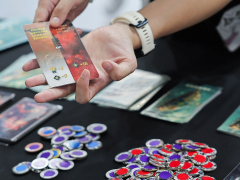Taiwanese company Mizo Games has launched a new board game which allows players to take on roles from military commanders and undercover operatives to civilian resistance fighters battling a fictional Chinese invasion.
The game, named “2045”, will be released in Taiwan this month. It will also be released later in January in English in Europe and the United States.
In August 2024, Mizo Games launched a crowdfunding campaign raising more than 4 million New Taiwan dollars ($121,707 USD) within two and a half months.
In an interview with Reuters news agency in December, Chang Shao Lian, founder of Mizo Games said: “I want players to feel they want to win and think about what they will do to win.”
The game is being released amid rising tensions between China and Taiwan, with China increasing military activities near the island and a mounting effort by civil defence groups to prepare for any potential invasion.
So how does the game work and could it be used to prepare for war?
What is 2045 all about?
The board game simulates a Chinese invasion of Taiwan 20 years in the future and players role-play characters over the 10 days leading up to an attack.
Rather than focusing solely on the defence of Taiwan, players are evaluated on how effectively they achieve their character’s specific goals.
“There are two types of victories, individual victory and the victory of Taiwan. The two outcomes pose a huge conflict of values for the players. I don’t want players to play the game with just the mindset to learn but I want them to play the game with the desire to participate in and win this war on the table,” Shao Lian told Reuters.
Players in 2045 can participate in different aspects of modern warfare, including cyberwarfare, economic meltdown and civil upheaval.
The creation of “2045” has encountered several challenges, notably concerns about censorship and production limitations.
The game’s controversial subject prevents its manufacture in China, a departure from the usual production practices of Taiwanese board game companies.
Has Mizo Games produced other warfare-themed board games?
Yes, Mizo launched its first warfare-themed game, Raid on Taihoku, in 2017. Set in Taiwan during World War II, players must survive the bombing of their city. The game is based on the US aerial assault on Kaohsiung (then known as Takao) in November 1944.
What is driving the popularity of military games?
Games with social and political themes are not new, according to Paul Booth, professor of media and pop culture at the College of Communication at DePaul University in Chicago, and author of Board Games as Media, who spoke to Al Jazeera.
“A game like 2045 is important as it allows us to imagine and play with the possibilities of what could happen. In a way that, like a TV show or a movie, we can watch it, we can feel invested. We can feel involved.
“The power of a game like this is to allow players to feel connected, like participatory, connected to this alternate history.”
2045 is part of a longstanding enthusiasm for “gamifying” important social issues, Booth said.
Boardgames which tap into social commentary go back more than a century. “The Landlord’s Game”, created in 1902 by Elizabeth Magie, was crafted to teach players the negative effects of land consolidation under private monopolistic control and land seizure.
In 1935, the game was adapted and commercialised by Charles Darrow and Parker Brothers, who modified its rules and themes to emphasise competition and wealth accumulation, and became known as Monopoly.
War is another such issue which has prompted the production of games both for military preparation for conflict and among civilians.
“War is a significant topic going back centuries. War games where generals would put out troops on a gigantic table and plot out military actions. That is a very common kind of board game antecedent,” explained Booth.
“The kind of war gaming culture is actually still going very strong, and we see it in things like Warhammer [released in 1983], or miniature tabletop games.”
It’s not just board games that are capturing the imagination of Taiwanese media companies when it comes to the idea of a Chinese invasion.
“Zero Day” a 10-episode TV fictional drama series, portrays a potential Chinese invasion. The show depicts a scenario in which the People’s Liberation Army (PLA), the military force of the People’s Republic of C





